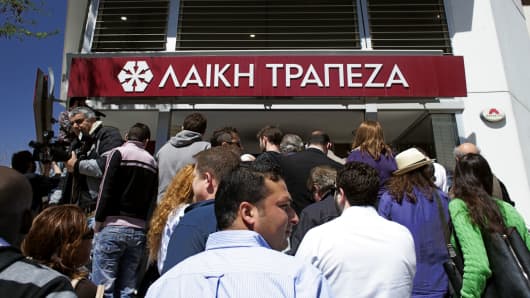There are certainly plenty of people who could be blamed for the economic crisis in Cyprus that caused worldwide anxiety last month. The potential culprits include Cypriot bankers who bet too heavily on Greece and a communist-led government that dithered as the losses piled up.
But increasingly, people on the financially stricken island nation are focusing their anger on another institution, one that is more accustomed to praise for its handling of the euro zone crisis: the European Central Bank.
Throughout much of the euro zone's financial crisis, the bank has faced criticism for not doing enough — not printing enough money or not buying enough bonds or not cutting interest rates fast enough. In Cyprus, though, the bank is accused of doing too much.
When the bank's governing council meets on Thursday, the hopes of recessionary Europe are pinned to its doing something to stimulate the regional economy — even if that is only the largely symbolic step of reducing its already historically low benchmark interest rate a quarter-percentage point, to 0.5 percent.
Some hold out hope that the bank and Mario Draghi, its leader, might soon take even bolder stimulus steps — although just what remains unclear.
In coming months and years, the euro zone plan is for the central bank to play an even more central role in overseeing European banks — acting as the master supervisor and, eventually, wielding the rule book by which failing banks would be banished from the field.
All of which is why complaints from Cyprus, the latest euro zone country to sustain a banking collapse, sound like either a startling indictment or a sore loser's excuse, depending on one's point of view.
"The big question is, did the E.C.B. help Cyprus or did it make things worse?" asked Nicholas Papadopoulos, chairman of the Committee on Financial and Budgetary Affairs in the Cyprus Parliament. Expressing a view widely shared in the country, he said, "My opinion is that it made things worse."
Critics in the Cypriot government that replaced the communists in February say the central bank broke its own rules by enabling Cyprus's central bank to keep the country's second-largest lender, Laiki Bank, on life support long after it was insolvent. That made the nation's banking collapse worse than it might have been otherwise, critics say.
The new Cypriot president has recently exchanged harshly worded letters with Mr. Draghi. But even as Cyprus levels its criticisms, much of Europe still wants the European Central Bank to ride to the rescue.
Central bank officials declined to comment in detail for this article, but they said that the Central Bank of Cyprus had taken the lead on crisis measures.
The European Central Bank's defenders say it is unfair to blame it for a larger policy blunder by European political leaders.
"The big mistake was not forcing negotiations in 2012 when it was obvious Cyprus was in trouble," said Nicolas Véron, a senior fellow at Bruegel, a research organization in Brussels. "But I wouldn't single out the E.C.B. It's really a collective failure of European institutions."
Still, the suggestion by a euro zone member, even crippled Cyprus, that the central bank committed serious policy missteps illustrates the hazards lurking as the bank heads further outside the realm of conventional monetary policy in hopes of keeping the euro zone intact.
As Cyprus demonstrates, the European Central Bank risks being sucked into the quagmire of local politics by measures intended to help struggling banks and prevent financial shocks. The hazard of such political entanglements, and the potential to make mistakes, might only grow as the bank begins assuming control of supervising euro zone banks in July.
Cypriot critics say the central bank acted as an enabler by acquiescing as the Central Bank of Cyprus provided low-cost financing to keep Laiki Bank afloat long after it should have been left to fail. The delay in dealing with problems at Laiki raised the cost of the bailout for taxpayers in Cyprus and the large depositors who will bear much of the cost, critics in the government say.
More From the NYT:
Greek Parliament Passes Plan for Layoffs
Europe's Small Businesses Continue to Struggle
Opposition to Austerity Grows Louder in European Parliament


